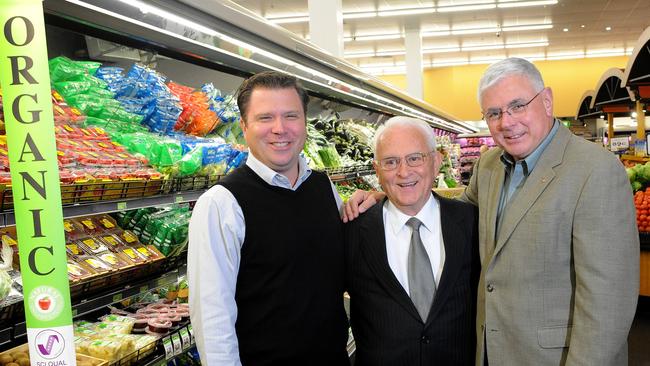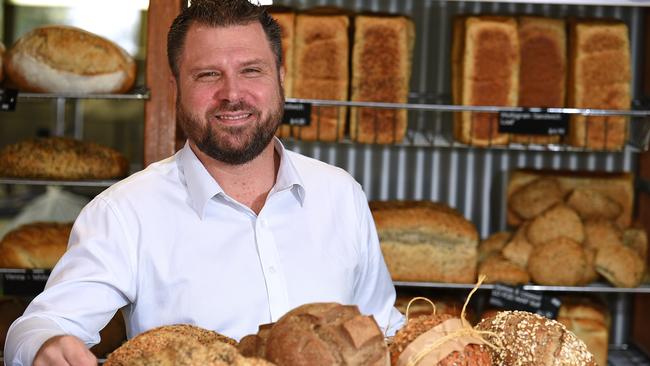Politicians need more education on supply chain issues says Countrywide boss Richard Hinson
From a teenage Woolworths trainee to chief of Countrywide, and an intense stint at Retail Food Group in between, Richard Hinson wants to shake up his sector.

Richard Hinson will never forget a flying visit he made to Parliament House in Canberra in between Covid-19 lockdowns in 2020 when he met with several senior government ministers and their staff to discuss the plight of the food industry.
“I was talking to some very senior government officials and MPs that should know a bit more about the market that we operate in. The view very much was that all of the food in Parliament House was supplied by Woolworths, including the restaurants and catering,’’ he recalls hearing with shock and surprise.
“It highlighted to us just how much we needed to focus on educating them on the supply chain outside of the supermarkets from end to end.”
A few months earlier Hinson had helped establish a group known as Independent Food Distributors Australia (IFDA), whose members represent over 200 independent, family owned businesses that operate 266 food distribution centres across Australia - half of which are in regional areas.
They purchase and on-sell more than $5.5 billion worth of food products and supply essential services such as hospitals, childcare centres, schools, aged care facilities, military bases, as well as commercial hospitality venues such as cafes, hotels and clubs.
“The pure essence of where IFDA started was to try and educate politicians in Canberra and those at the state level about how vibrant our industry is, and how many people it employs and what it delivers to the economy. There was no recognition of that to any degree,” Hinson says.

He is chairman of the group, which is run by former government adviser Richard Forbes.
Last month IFDA joined with the National Farmers Federation (NFF), the Australian Meat Industry Council, (AMIC), the Master Grocers Australia (MGA) and the Australian Association of Convenience Stores (AACS) in an unprecedented alliance between food industry associations across the food supply chain.
Their union, known as the Food Industry Alliance, is designed to help underpin reliable and affordable access to food for all Australians at a time when higher staff costs, staff shortages, Covid-19 rules and rising commodity and energy prices are causing major headaches for the sector.
In particular the alliance wants to work constructively with the new federal government on the labour shortage crisis, which has meant fruit and vegetables have remained unpicked, meat processing remains under capacity, grocery shelves are not being restocked, and restaurants and cafes are being forced to operate sub-optimal business hours.
Rising fuel and energy costs are also significantly impacting food businesses. Woolworths chief executive Brad Banducci recently announced the group was freezing prices on everyday essentials, such as flour, sugar, vinegar, laundry powder and nappies, until the end of the year.
“Unfortunately, most of the issues that the government have on their plate have a direct impact on the food supply chain in Australia,” Hinson says.
“Whether it’s energy costs, fuel, wages, inflation, source of supply for food, all of that is what we deal with every single day.
“We’ve got a group of industry bodies together now to try and raise the flag of food concerns in Australia.”
Given the current supply chain disruption highlighted currently by the lack of availability of lettuce in supermarkets due to floods and the most recent flood crisis this week in NSW, the formation of the new Food Industry Alliance (FIA) could not be better timed.
Vital services
But Hinson has long had strong views on the importance of re-designing the framework to ensure food is always ‘available’ and as ‘affordable’ as possible.
He, IFDA and the FIA are now demanding a national food plan to focus on regional supply chains and address domestic supply chain inefficiencies to ensure Australia is less vulnerable to international forces.
They also want better contingency planning during natural disasters to ensure all of those in the food supply chain are considered when there is reduced availability of food supplies.
Earlier this year flooding of the nation’s critical rail infrastructure made headlines when floods in South Australia washed away parts of the railway linking the eastern states with Western Australia and the Northern Territory.
The flooding led to massive supply shortages in Western Australian supermarkets given 80 per cent of WA’s land-based freight arrives via rail.
“WA is a reason you need to redesign the food supply chain. Everyone has seen the challenges for retailers of having stock on shelves,” Hinson says.
“But what we found during Covid-19 is there were other avenues to market. Fruit and vegetable shops and butchers had meat on show. Independent supermarkets supplied by Metcash that focussed on supporting regional businesses had stock on the shelves.”
Hinson believes a national food plan must focus on creating regional supply hubs that embrace regional food bowls and allow those areas to be self sufficient.
“Covid-19 I think showed that if there was a plan in place and it was very well coordinated, there is food available for everyone in the country. What it also highlighted was the inefficiency and risk around the big corporate supply chains,” he says.
In this context in late June representatives of the new Food Industry Alliance met with both the chairman and deputy chairman of the Australian Competition and Consumer Commission - Gina Cass-Gottlieb and Mick Keogh - to also stress the importance of competition reform policy to protect farmers and SMEs from unfair and anti-competitive commercial practices.
The competition regulator last year approved the acquisition by Woolworths of the rich-lister Smith family’s PFD Food Services, one of the nation’s two major food distributors, despite vocal concerns expressed by the IFDA about the impact on competition.
Last month the Fair Work Commission also made its ruling to lift minimum wages by 5.2 per cent which would see the lowest paid workers receive around $40 extra a week.
Woolworths announced on the day that hundreds of thousands of its supermarket workers, from shelf stackers and checkout staff to warehouse employees, would get the pay rise.
Hinson says that more broadly across the food sector, the Fair Work Commission announcement will be “a really interesting one”.
“Restaurants and cafes still aren’t at full capacity to where they were prior to Covid-19. And they’re trying to absorb an enormous amount of cost increases caused by global supply chain issues, in part just because of rising costs,” he says.
“So it’s a really tough marketplace for people of all sizes to play. Whether you’re a producer or restaurant cafe owner - we sort of bridge the gap between the two - they are feeling that pressure across the board.
Early lessons
Hinson has long been passionate about the importance of independent, family-owned food industry businesses after starting his career in the sector as a trainee at Woolworths in South Australia at the age of 17, where he learned directly from the retailer’s legendary boss Paul Simons.
Within a few years he was managing his first Woolworths supermarket in the small South Australian country town of Millicent, where many in the town worked for multinational personal care giant Kimberly Clark’s giant paper mill.
After a decade with Woolworths, Hinson became an account manager for global confectionery company Wrigley before in 2007 he took a role managing merchandising, marketing, distribution and logistics for grocery wholesaler Metcash in South Australia and Queensland.
This provided him with the opportunity to work closely with some of the nation’s leading entrepreneurial family businesses.

In November 2017 he joined the listed Retail Food Group to run its Australian franchise business, weeks before an investigation into the plight of struggling franchisees was published.
By May the following year he had been thrust into the chief executive role for the company that runs a range of franchise networks including Gloria Jean’s, Crust Pizza, Michel’s Patisserie and Brumby’s Bakery.
“The virtues of why I joined was the work with SMEs to help them be successful,” he says.
“I did a roadmap for those guys that was highly engaged with the franchisees. It was about franchisees having a voice and the business and franchisees being sustainable. They largely endorsed the plan we put in place.”
Yet by December 2018 Hinson had resigned, a week after new chairman Peter George told the RFG annual general meeting that the firm’s financial situation was “unsustainable” and RFG needed to reduce its cost base “by a large amount”, sell assets and possibly recapitalise the business to reduce bank debt.
“At a point in time, the role that I was playing and the plan that we had was one that the board aligned to. I think by the time I left for business, we had a difference of opinion on how we could execute that outcome,” Hinson says.
“I’m a firm believer in doing what you say you are going to do, and it became very apparent to me that it wasn’t the right time for me in that business.”

Today Hinson’s full time job is as chief executive of Countrywide, the nation’s largest independent food distributor which has purchasing power worth billions of dollars and was a foundation member of the IFDA.
In the role he is trying to revolutionise many aspects of the food supply chain.
The firm has 160 warehouses and works to leverage the scale of its network with big multi national suppliers to the benefit of restaurants and cafes throughout the country.
“We work with suppliers to help generate rebates for our members to be competitive with other players in the marketplace,” Hinson says.
Since taking over the role three years ago he has delivered a strategic road map to help Countrywide’s members remain sustainable whilst helping the group transition from a buying house to a members solutions business.
“I was brought in to change the culture. We were a traditional buying and marketing house. Our business has now changed enormously. We have digital loyalty programs, tools for members to engage with customers better,” he says.
“We want to help the capability of our members to compete in the marketplace. Yes we buy food. But our network also uses fuel, fleet management, warehouses - we can leverage those as a network.”
During Covid-19 Countrywide launched what it called the Platinum Partners Program to secure its members income during the pandemic when 70 per cent of their revenue disappeared overnight.
This program now opens opportunities for suppliers to have better engagement with grass roots farmers through more efficient use of data to provide information and help them understand the market better.
“A business rewarded purely on growth is going to struggle in this current world,” Hinson says.
“We have redefined what value meant to our supplier base. We can cater a package for a supplier which allows them to engage with our network more efficiently and effectively.”






